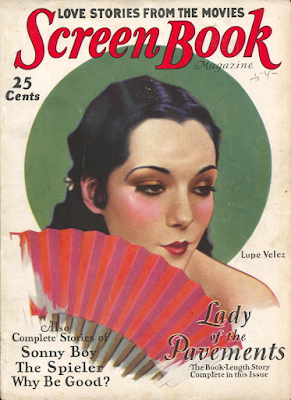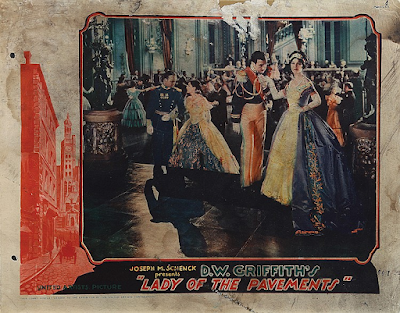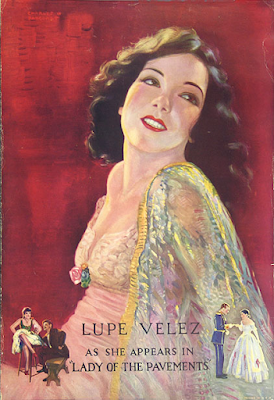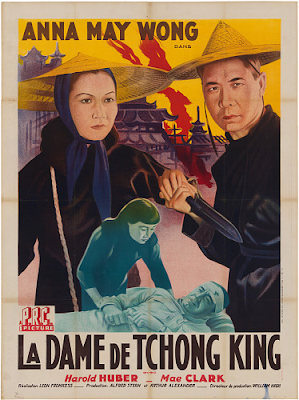Wonderland Burlesque's
Let's All Go To The Movies
She's A Lady!
Part XXI
Yes, sometimes? It takes a lady.
Or so these films would have us believe.
They promise lots of drama, the occasional comedy or musical, and a little bit of dirt!
Let's take a walk down Hollywood Blvd. and shine a light on these magnificent classic films.
This way, if you please. But remember...
Ladies first!
--- ---
Lady Of The Pavements
(1929)
AKA: Lady Of The Night
Karl, a German diplomat in Paris, discovers that his fiancée Diane has been cheating on him. He tells her that he would rather marry a "girl of the streets" than her. Outraged, Diane decides to grant him his wish, and enlists the services of a Spanish singer/dancer from a disreputable nightclub to pose as a sophisticated, convent-educated singer, and surreptitiously arranges for her to meet Karl.
This American romantic drama was directed by D. W. Griffith and stars Lupe Vélez, William Boyd, and Jetta Goudal.

The film featured a theme song entitled Where Is The Song Of Songs For Me? which was composed by Irving Berlin.

The film featured a theme song entitled Where Is The Song Of Songs For Me? which was composed by Irving Berlin.
This film is literally all over the place: although issued with a synchronized musical score, some dialogue sequences, and one Irving Berlin song sung by Lupe Velez, the soundtrack for this film, recorded on disc, is thought to have vanished. Sound discs 6 and 8 are preserved in the UCLA Film and Television Archives, the film itself survives in the Mary Pickford Archives, while additional soundtrack discs to this film were donated by Arthur Lennig to the George Eastman House Motion Picture Collection in Rochester, New York. Where the other sound discs are at this time is unknown.
The Smoking Dog Cafe, where Lupe Velez sings, is the name of an actual Paris restaurant (Au Chien Qui Fume), which opened in 1920. However, unlike the place in the movie, described as "the lowest dive in Paris," it was, at most, bohemian, and was in a respectable neighborhood.
Nicknamed 'The Mexican Spitfire' by the media, Vélez's personal life was as colorful as her screen persona. She had several highly publicized romances with Hollywood actors and a stormy marriage with Johnny Weissmuller. Vélez died at age 36 in December of 1944 due to an intentional overdose of the barbiturate drug Seconal. Her death and the circumstances surrounding it have been the subject of much speculation and controversy - involving a pregnancy, actors Harald Ramond and Gary Cooper, and a possible cover-up.
"What I attribute my success?, I think, simply, because I'm different. I'm not beautiful, but I have beautiful eyes and know exactly what to do with them. Although the public thinks that I'm a very wild girl. Actually I'm not. I'm just me, Lupe Vélez, simple and natural Lupe. If I'm happy, I dance and sing and acted like a child. And if something irritates me, I cry and sob. Someone called that 'personality'. The Personality is nothing more than behave with others as you really are. If I tried to look and act like Norma Talmadge, the great dramatic actress, or like Corinne Griffith, the aristocrat of the movies, or like Mary Pickford, the sweet and gentle Mary, I would be nothing more than an imitation. I just want to be myself: Lupe Vélez."
Lady From Nowhere
(1936)
Olly Dunlop, a manicurist at the barber shop in a Fifty Avenue hotel, is summoned to room 916, which is currently occupied by 'Alfred Brewster', who is actually a gangster named Al Lustig. Shortly after she arrives at the room, a rival gangster named Fletcher barges in and is murdered by Lustig. Polly escapes, but realizes she is the only witness and fears for her life. She borrows money from her roommate, Mabel Donner, and catches a train to Hartford, Connecticut, getting off at rural Clearview Junction. Meanwhile, college girl Dorothy Barnes, has left school to elope with a foreign prince much to the displeasure of her father, millionaire James Gordon Barnes, who has offered a large reward to anybody who knows where she is. Local newspaper reporter, Earl Daniels, mistakes Polly for Dorothy. As this is happening, Lustig gathers all his henchmen in Jersey City and dispatches them to search for Polly.
This American crime drama was directed by Gordon Wiles and stars Mary Astor, Charles Quigley and Thurston Hall.
In 1936, Astor's career was nearly destroyed by scandal. She had an affair with playwright George S. Kaufman and was branded an adulterous wife by her former husband during a custody fight over their daughter. Overcoming these stumbling blocks in her private life, she went on to greater film success, eventually winning an Academy Award for Best Supporting Actress for her portrayal of concert pianist Sandra Kovak in The Great Lie (1941).She is probably best remembered for her role in The Maltese Falcon (1941).
Lady From Louisiana
(1941)
Northern lawyer John Reynolds travels to New Orleans to try and clean up a local crime syndicate controlling the lottery. Although he meets Julie Mirbeau and they are attracted to each other, the fact that her father heads the lottery means they end up on opposite sides of the law. When her father is killed, Julie becomes more and more involved in the shady activities, going so far as to time and again block Reynolds' attempts at prosecution.
This American western drama was directed by Bernard Vorhaus and stars John Wayne, Ona Munson and Ray Middleton.
Republic Pictures spared no expense in making the film, with large numbers of costumed extras and recreations of Mardi Gras. The studio's high standard of action scenes and special effects miniatures come to the fore in the fight scenes and flood climax.
A 1941 Time magazine review likens Wayne's character to crusading New York Prosecutor and District Attorney Thomas E. Dewey. The reviewer wrote that the film "records the triumph of a 19th-Century Thomas E. Dewey (John Wayne) over one of Dewey's favorite rackets - the lottery."
--- ---
Lady From Chungking
(1942)
In Japanese-occupied China, Madame Kwan Mei is the leader of a resistance organization based in a rural village. When two American airmen are shot down near the village, she makes plans to rescue them and have them help her organization. Then, when Japanese General Kaimura arrives in the village, she realizes that a major operation is imminent. She decides to impersonate an aristocrat, in order to win the general's confidence and learn his plans.
This war drama was directed by William Nigh and stars Anna May Wong, Harold Huber and Mae Clark. The Lady from Chungking differed from the usual Hollywood war film in that the Chinese were portrayed as heroes rather than as victims rescued by Americans. Even after American characters are captured by the Japanese, the primary goal of the heroes is not to free the Americans, but to prevent the Japanese from entering the city of Chongqing (Chungking).
Last starring role for Anna May Wong and her last picture for seven years until Impact (1949), her penultimate feature film. During World War II, with the negative attitude toward Asians, accomplished Chinese-American Hollywood star Anna May Wong was reduced to making only two feature films, including this one, both for the poverty row PRC (Producers Releasing Corporation).
This film, along with Java Head (1934) are the only films in which Anna May Wong was allowed to kiss a Caucasian man. In this film's case, she kisses the Japanese Gen. Kaimura who is played by Harold Huber, who is ethnically Russian. This was one of several war-era films in which Huber was cast as an Asian, even though he was of Russian-Jewish descent.
During World War II (when this film was made) Anna May Wong went out of her way to clarify that she was of Chinese heritage and not Japanese. This included regularly supporting and doing volunteer work for organizations raising funds for Chinese resistance to the Japanese invasion and domination of China. She donated the money she earned for the two films she made for PRC during the war to a Chinese resistance organization.
Blonde Mae Clarke who plays the singer sympathetic to the Chinese resistance's cause, had both of the best known roles in the same year. In 1931, she was featured as both the gun moll in whose face James Cagney mashed half a grapefruit in The Public Enemy (1931), and as the bride of Victor Frankenstein, who was terrorized by the monster in the original Frankenstein (1931).
Lady On A Train
(1945)
While in a train halted at a station, Nikki Collins witnesses a murder committed in a nearby building. When she goes to the police they think she's read one too many mystery novels. She then enlists a popular mystery writer to help with her sleuthing.
This American light-hearted comedy/crime film noir was directed by Charles David and stars Deanna Durbin, Ralph Bellamy, and David Bruce.
Donald Cook, Robert Paige and Franchot Tone were discussed as possible leading men, however, in January the job went to David Bruce who had played the supporting role in Durbin's previous two films.
Despite singing three songs, this is a rare non-musical movie role for Deanna Durbin, who had been one of Universal Pictures' biggest box office stars in the late 1930s and early 1940s. By the mid-40s, she had tumbled from 12th place to 25th. Since audiences expected to hear Durbin sing, the screenwriters had to work at least a few singing opportunities into this film's faux murder mystery plot. At one point, they resort to having Durbin's character sing an extensive acapella version of Silent Night over the phone to her father on Christmas Eve.
A trio of character actors who would go on to television careers appear in this film : Edward Everett Horton narrated Fractured Fairy Tales on the Rocky and Bullwinkle Show; William Frawley, who appeared on both I Love Lucy and My Three Sons; and Allen Jenkins did the voice of Officer Dibble on Top Cat.
Deanna Durbin and director Charles David were wed in 1950 and retired to a life in rural France. They remained married for fifty years until his death in 1999. They met and fell in love during the shoot for this film, though they did not act on their attraction, as Durbin was then married to producer Felix Jackson.
Durbin is on record stating her dislike of the Hollywood studio system, emphasizing that she never identified herself with the public image that the media created around her. She spoke of the Deanna persona in the third person, and considered the film character 'Deanna Durbin' to be a byproduct of her youth and not her true identity. Shunning Hollywood and several offers to make a comeback (including the starring role in the film version of My Fair Lady), she steadfastly asserted her right to privacy, something she maintained until the end of her life.
And that's all for now, folks.
Tune in next time...
Same place, same channel.
Lady On A Train - Movie Trailer
(1945)

































































































1 comment:
I always love it when supporting actors find their way in the history books! It's character actors who manage to have long careers.
Post a Comment